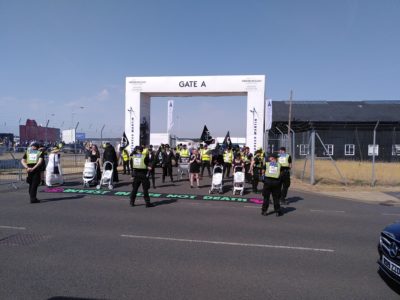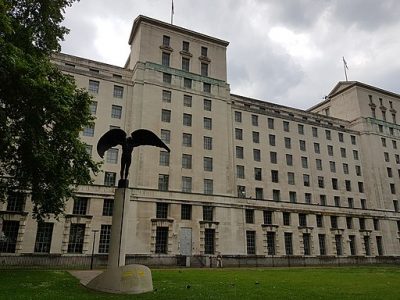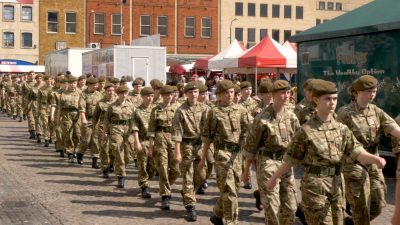Armed forces visits to schools debated in the Welsh Assembly!
ForcesWatch Comment
Our reaction to today’s Welsh Assembly debate on armed forces visits to schools in Wales, which represents a major step forward in the scrutiny of the ethics of the military’s engagement with the education system.
This afternoon the Welsh Assembly debated the issue of armed forces visits to schools in Wales, following the Welsh Government’s acceptance of the Welsh Assembly Petitions Committee’s three recommendations for ensuring greater transparency and balance of views regarding these visits. The debate can be watched online here, and a transcript of it can be read online here.
Earlier in the day, the issue was explored by BBC Wales in a written piece and two lively radio debates – one in Welsh and one in English – both of which featured a spokesperson from ForcesWatch, raising our concerns about the recruitment agenda behind the visits, the greater frequency of visits to schools in areas of greater deprivation, and the sanitised, glamourised image of the armed forces that students often seem to be getting from the visits. Welsh-language S4C TV explored the issue in their evening news (from 19mins) and then the political discussion show (from 14.50mins)
The Welsh Assembly debate saw a range of views expressed, by Welsh Assembly Members from all five Parties, although there was a general consensus that the issues was an important one because of the unique nature of an armed forces career, and a general support for the recommendations. The Petitions Committee chair William Powell AM opened the debate, noting that the Petitions Committee found that whilst a ban on armed forces visits to schools would be inappropriate, there was evidence that the visits occur more in areas of disadvantage, and asserted that the visits must not involve glamourised representations of the armed forces being put across unchallenged to students.
‘Joining the Army is not a real life video game’
Jenny Rathbone AM stressed that ‘Joining the Army is not a real life video game’ – that military life can be ‘dangerous & unpredictable’, with the possibility of having ‘to kill someone you don’t know and have never met’, and of being killed or permanently injured, part of the ‘horrors of war’. She noted that the UK is the only country in the EU to recruit 16 year-olds into the armed forces (something ForcesWatch is campaigning to change). She also mentioned concerns about the low levels of literacy among many recruits, and about the spate of deaths during armed forces training in recent years. She stated that ‘We should be very cautious about Army recruitment in schools’.
Darren Millar AM, chair of the Cross Party Group on Armed Forces and Cadets, reiterated the claim often made by the armed forces and the Ministry of Defence, that the armed forces never visit schools for recruitment purposes, but rather that they help to deliver the National Curriculum, and that they only attend schools on invitation. ForcesWatch have deconstructed these claims many times, most recently in this Wales-specific briefing. We would not disagree with his points that it is unsurprising that some schools receive more visits because their headteachers are well-disposed to them, and they have long associations with the armed forces. However, his emphasis on the trades that the armed forces can offer, and the armed forces’ peace-keeping role, overlooks the facts that the youngest, most disadvantaged recruits, are greatly over-represented in the most dangerous and least-transferable skills-providing parts of the armed forces.
This emphasis on potential skills provided by the armed forces also overlooks the fundamental role of the military; as the Army stated in a rare, candid moment in 1996:
‘The fundamental and perhaps only difference of significance, between military service and other legitimate professions and occupations is that servicemen and women must be prepared, at any time and in the service of others rather than themselves, to participate in protracted and sometimes wholesale destruction and violence, to kill and be killed for benign and politically justifiable purposes… It is easy in the myopia of a prolonged period of peace and low intensity operations to lose sight of this ultimate reality.’
Lastly, Millar’s claim that other employers would visit schools on a similar level to the armed forces if they were invited or made more of an effort, does not take into account that the armed forces have significant resources for these visits. For example, the Welsh Ambulance Service hardly makes any school visits as it doesn’t have the resources to do so, and the Welsh Fire Service make more visits but focus on fire safety. In any case, the professions are not comparable; as the Army quote above goes on to say:
‘Other professions, such as the police and fire service, also face death and injury, often more frequently than do members of the Army, but not on the same potential scale, or with the same inherent levels of lethal danger; none face the potentially devastating experience of deliberately taking life as a normal part of their roles.’
Jeff Cuthbert AM, a Welsh Government Minister, said that he agreed with the Petitions Committee’s three recommendations: to conduct further research into the distribution and frequency of armed forces visits to schools in Wales, to ensure that guidance issued to schools on how to facilitate visits by outside organisations takes account of the unique nature of the armed forces, and to encourage a wider range of employers to visit schools (all accepted by his Government), but not the petition that initiated the investigation. He echoed the Petitions Committee claim that there was no targeting of schools in deprived areas, and asserted that the armed forces should not be treated any differently to other employers.
Visits to schools carried out by ‘recruiters’
Bethan Jenkins AM, a member of the Petitions Committee, noted some of the important nuances in the debate. She argued that the armed forces visited schools more than other employers because they were proactive, seeking long-term relationships with schools, and that they have resources for visits where other organisations do not. She said that she resented the suggestion that questioning the visits was unpatriotic or disrespectful to those in the armed forces. She referred to ForcesWatch’s research that demonstrates how state secondary schools in Wales are visited far more than private schools.
She responded to the claims that the visits do not amount to recruitment by noting – as ForcesWatch have repeatedly – that until a few years ago the military themselves frequently referred to the visits as ‘recruitment’/being carried out by ‘recruiters’, and arguing that the armed forces’ approach to recruitment is a long-term one, with school visits encouraging young people to sign up later. She also raised concerns about the lack of detail given to students regarding the risks and downsides of the armed forces, and lamented the glamourised armed forces adverts that students see on television, online, and at the cinema. She stressed that the armed forces can offer young people a lot, but that students needed to have their horizons expanded to be aware of the opportunities available with other employers.
Joyce Watson AM agreed that young people should be exposed to as many opportunities as possible, though she suggested (rightly) that levels of visits depend (partly) on the armed forces’ presence in the area. She welcome the Government’s acceptance of the Petitions Committee’s recommendations, but argued that it is up to schools to make decisions about the best interests of young people. She suggested that the Petitions Committee’s report be distributed to all secondary schools in Wales to help raise awareness about the issue. This is something that ForcesWatch would welcome; it was noted by William Powell AM in his summary, and he implied that it should be possible.
Russell George AM, another member of the Petitions Committee, said this was one of the more interesting debates that had happened in the chamber. He asserted that armed forces recruitment in schools would be unacceptable. Whilst noting the debate about the definition of ‘recruitment’, he disappointingly employed the military’s very narrow definition of recruitment as signing up then and there on school premises, rather than recruitment as a longer-term process.
Recruiting at 16 is too young
Alun Ffred Jones AM raised the issue of mental health problems in the armed forces, and noted that a disproportionate number of recruits are from disadvantaged areas. He also asserted that the armed forces should not recruit 16 year-olds, as this was too young, with or without parental consent.
Julie James AM, the Deputy Minister for Skills and Technology, spoke last. She expressed support for the armed forces’ ‘youth engagement’ activities. She outlined the Welsh Government’s plans for realising their acceptance of the Petitions Committee’s three recommendations, though she stressed that research into the nature of armed forces visits was not a priority, citing budget restraints. She agreed that young people needed to be exposed to a diversity of employers to make the best choices for them, but claimed that it is impossible that young people are not aware of the reality of armed forces life, and that it was patronising to imply that those considering joining needed to be guided on this. However, ForcesWatch believe that the sanitised, glamourised image of the armed forces that young people encounter so often – for example through recruitment adverts, at armed forces parades and exhibitions, and in video games – far outweighs the more balanced, critical representations, and that guidance to help them make an informed choice, whether about joining themselves, or just on their views of the military and military approaches, is therefore essential.
Conclusion
We at ForcesWatch take significant encouragement from this Welsh Assembly process. Whilst some of the issues have not been given the attention that we think they merit, it is a huge step forward, with the Welsh Assembly and Welsh Government recognising that there are concerns with armed forces visits to schools that need to be acted upon. We will follow the Welsh Government’s work on the issue closely, and hope to see similar positive moves elsewhere in the UK.
See more: military in schools/colleges, education, military ethos
Like what you read?
> Sign up for our newsletter or blog notifications
> Support our work – from just £2 a month










